人教版九年级英语上册教案- - Lesson 28
九年级英语上册Lesson28ThestudyofLivingThings导学案(无答案)(新版)冀
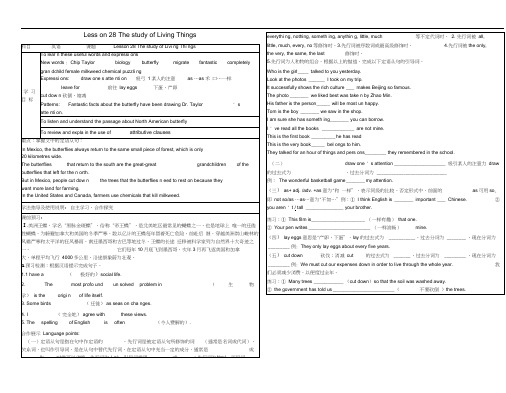
The butterfliesthat return to the south are the great-greatgrandchildrenof the
butterflies that left for the n orth.
But in Mexico, people cut dow nthe trees that the butterflies n eed to rest on because they
Less on 28 The study of Living Things
科目英语课题Lesson 28 The study of Livi ng Thi ngs
学 习 目 标
To lear n these useful words and expressi ons
New words:Chip Taylorbiologybutterflymigratefantasticcompletely
I've read all the booksare not mine.
This is the first bookhe has read
This is the very bookbel ongs to him.
They talked for an hour of things and pers onsthey remembered in the school.
the very, the same, the last修饰时。
5.先行词为人和物的组合。根据以上的描述,完成以下定语从句的引导词。
Who is the girltalked to you yesterday.
Look at the photosI took on my trip.
人教版九年级上册英语教案(优秀5篇)
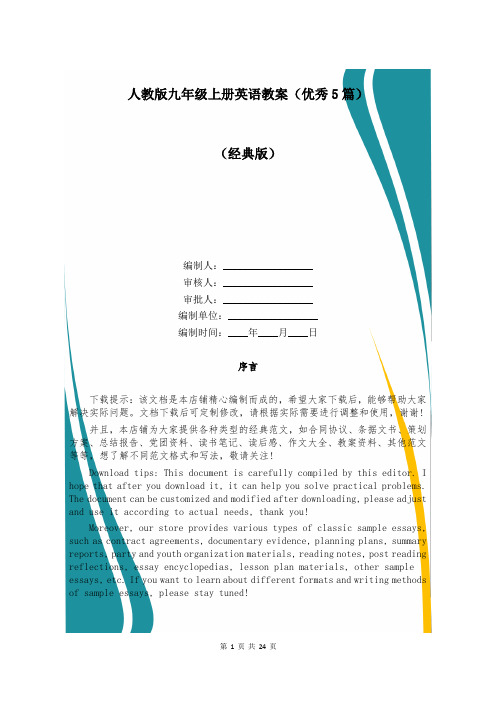
人教版九年级上册英语教案(优秀5篇)(经典版)编制人:__________________审核人:__________________审批人:__________________编制单位:__________________编制时间:____年____月____日序言下载提示:该文档是本店铺精心编制而成的,希望大家下载后,能够帮助大家解决实际问题。
文档下载后可定制修改,请根据实际需要进行调整和使用,谢谢!并且,本店铺为大家提供各种类型的经典范文,如合同协议、条据文书、策划方案、总结报告、党团资料、读书笔记、读后感、作文大全、教案资料、其他范文等等,想了解不同范文格式和写法,敬请关注!Download tips: This document is carefully compiled by this editor. I hope that after you download it, it can help you solve practical problems. The document can be customized and modified after downloading, please adjust and use it according to actual needs, thank you!Moreover, our store provides various types of classic sample essays, such as contract agreements, documentary evidence, planning plans, summary reports, party and youth organization materials, reading notes, post reading reflections, essay encyclopedias, lesson plan materials, other sample essays, etc. If you want to learn about different formats and writing methods of sample essays, please stay tuned!人教版九年级上册英语教案(优秀5篇)九年级是整个初中阶段的重要一年,因此教师需要学习先进的教育理念,认真准备每一次教案。
新人教版九年级英语上册全册教案
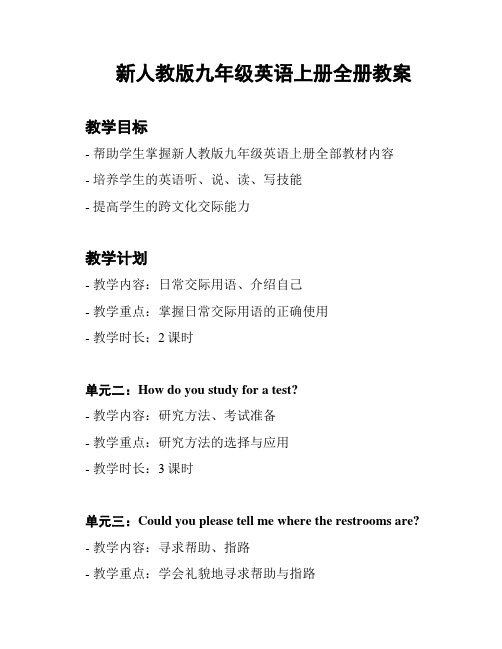
新人教版九年级英语上册全册教案教学目标- 帮助学生掌握新人教版九年级英语上册全部教材内容- 培养学生的英语听、说、读、写技能- 提高学生的跨文化交际能力教学计划- 教学内容:日常交际用语、介绍自己- 教学重点:掌握日常交际用语的正确使用- 教学时长:2课时单元二:How do you study for a test?- 教学内容:研究方法、考试准备- 教学重点:研究方法的选择与应用- 教学时长:3课时单元三:Could you please tell me where the restrooms are? - 教学内容:寻求帮助、指路- 教学重点:学会礼貌地寻求帮助与指路- 教学时长:2课时单元四:I used to be afraid of the dark.- 教学内容:过去的经历和惯- 教学重点:掌握过去式的使用- 教学时长:2课时单元五:What are the benefits of going green?- 教学内容:环境保护、可持续发展- 教学重点:理解环境保护的重要性- 教学时长:3课时单元六:I love music that I can dance to.- 教学内容:音乐、电影与艺术- 教学重点:学会表达自己对音乐、电影和艺术的喜好和感受- 教学时长:2课时单元七:Teenagers should be allowed to choose their own clothes.- 教学内容:青少年的权利与责任- 教学重点:理解和讨论青少年应有的权利与责任- 教学时长:3课时单元八:Reading for pleasure- 教学内容:阅读和写作- 教学重点:培养学生的阅读兴趣和写作能力- 教学时长:4课时单元九:Wildlife protection- 教学内容:野生动物保护- 教学重点:了解野生动物保护的重要性,并表达自己的看法- 教学时长:2课时单元十:Musical instruments- 教学内容:乐器与音乐- 教学重点:了解各种乐器和音乐类型,并能进行简单的介绍- 教学时长:3课时教学评价- 结合课堂表现、作业成绩、测试等多种评价方式进行评价- 通过个人表现、小组合作等方式培养学生的主动研究能力- 鼓励学生参与课堂互动,提高口语表达能力参考资料- 教材:新人教版九年级英语上册- 辅助教材:听力材料、课外阅读材料等。
人教版九年级英语上册教案(全册)
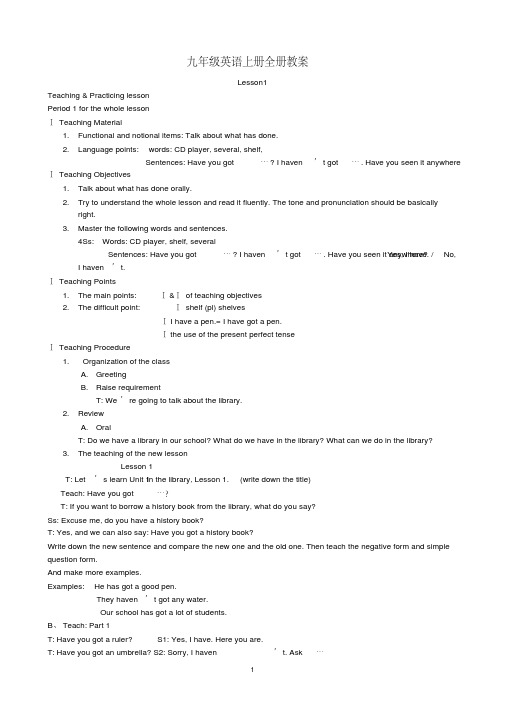
九年级英语上册全册教案Lesson1Teaching & Practicing lessonPeriod 1 for the whole lessonⅠ Teaching Material1.Functional and notional items: Talk about what has done.nguage points: words: CD player, several, shelf,Sentences: Have you got …? I haven’t got …. Have you seen it anywhere Ⅰ Teaching Objectives1.Talk about what has done orally.2.Try to understand the whole lesson and read it fluently. The tone and pronunciation should be basicallyright.3.Master the following words and sentences.4Ss: Words: CD player, shelf, severalYes, I have. / No, Sentences: Have you got …? I haven’t got …. Have you seen it anywhere?I haven’t.Ⅰ Teaching Points1.The main points: Ⅰ&Ⅰ of teaching objectives2.The difficult point:Ⅰ shelf (pl) shelvesⅠI have a pen.= I have got a pen.Ⅰthe use of the present perfect tenseⅠ Teaching Procedureanization of the classA.GreetingB.Raise requirementT: We’re going to talk about the library.2.ReviewA.OralT: Do we have a library in our school? What do we have in the library? What can we do in the library?3.The teaching of the new lessonLesson 1T: Let’s learn Unit 1 In the library, Lesson 1. (write down the title)Teach: Have you got …?T: If you want to borrow a history book from the library, what do you say?Ss: Excuse me, do you have a history book?T: Yes, and we can also say: Have you got a history book?Write down the new sentence and compare the new one and the old one. Then teach the negative form and simple question form.And make more examples.Examples: He has got a good pen.They haven’t got any water.Our school has got a lot of students.B、Teach: Part 1T: Have you got a ruler? S1: Yes, I have. Here you are.T: Have you got an umbrella? S2: Sorry, I haven’t. Ask …Ask the Ss to use Part 1 to make new dialogue in pairs and then ask some to do it in front of the class. Teach player” at the same time.B.Teach: severalT: Have you got a pen? How many pens have you got?S1: FiveT: We may also say: “You’ve got several pens.”Write down the word: severalB.Teach: shelfT: Just now we talked about the library, we know there are many books in the library. Where are the books put? Teach: on the shelf shelf (pl) shelvesB.Part2T: Now I’d like you to make a dialogue talking about borrowing books about different subjects.Do it in pairs first then ask some to do it.Analysis: books about … at the moment = now = right nowB.Part 3Dialogue 1Listen and answer: Well, when you borrow books from the library, you must be careful, but Jim is not careful. What happened? Where was the book?Then read it and learn the dialogue.Analysis: Have you seen it anywhere? ( tense and the use of anywhere)Dialogue 2Listen and answer: How about Tom? What has he lost? Where was it?Read and learn.Analysis: have lost (tense)Perhaps he’s seen it. ( ‘s is short for has)I saw it on Lin Tao’s desk five minutes ago. ( tense)B. Conclusion1. have got = have 2 several = a few 3.on the shelf 4. the present perfect tenseA.Wb. Ex1 &24.Homework1.Do Wb. Ex 3&42.Recite Part 3Lesson 2Reading lesson2 periods for Lesson 2ⅠTeaching Materialsnguage points:Words: already, yard, schoolyard, step, librarian, probably, pay, sadly, mark, bookmarkPhrases: used to, put down, pay for, come up withSentences: Her hobby is reading.So was the librarian.Now her lost books are usually returned to the library.ⅠTeaching Objectives1.Read the whole lesson and try to understand its content. Make sure to answer the questions in Wbcorrectly.2.Read the lesson fluently, the pronunciation and tone should be right.Ⅰ Teaching Points1.The main points---(1)&(2) in teaching objectives2.The difficult pointsA: already, “al” makes an / / soundB: the difference between “on” and “about”C: make sb. + adj.D: used to do sth.E: come up with an idea= think of an ideaPeriod 1Ⅰ Teaching Procedureanization of the classT: Today we are going to Lesson 2, in Lesson 2, we are going to talk about the library.2.ReviewT: Before we learn the new lesson, let’s go over what we learned yesterday.A.OrallyHave = have got eg. They don’t have any shelves.= They haven’t got any shelves.Has = has got eg. Does he have a CD player?= Has he got a CD player?Several=a fewOn the shelfThe construction and concept of the present perfect tenseB.Recite Part 2C.Wb. Ex33.The teaching of the new lessonA.Lesson 2T: We know we can borrow books from a library. But if we lose the books, what should we do? Letgo on to learn Lesson 2, we will know the answer in it.( write down Lesson 2)B.pay forWell, you should pay for it.Teach: pay, paid, paidPay for : give money to sb. for sth.C.onT: Why do people like to go to the library?T: Because there are books on many different subjects.D.knowledgePeople can learn much knowledge from them.E.Part 1 Pre-readF.Part 2Ask the Ss the read the passage and answer questions in their Wb. Ex 1G.Read and learnParagraph 1T: How old is the writer’s grandma?What was she?What is her hobby?Why does she love books?4.Homework.A. Read the end of the text and finish the exercises in Wb.Junior English for ChinaBook 3Lesson 3课型:讲练课ⅠTeaching Materials1.Functional and notional itemsAsk questions about something has donenguage MaterialsWords: encourage, once, abroad, copyPhrases: think of, encourage sb. to do sth., get sth. back, pick upSentences: Have you ever been abroad? Yes, just once.I’ve just cleaned the kitchen.Really? I did that hours ago.Grammar: The difference between the present perfect tense and the past indefinite tenseⅠTeaching Objectives1.Learn to ask questions about something has done2.Read the whole lesson fluently, and pronunciation and intonation should be right.3.Master the following materials(4 skills) Words: once, copyPhrases: think of, pick upSentences: Have you been abroad? Yes, only once.(3 skills) Words: encourage, abroadPhrases: get sth. back, be abroadⅠ Teaching Points1.The main points: (1)&(2) in teaching objectives2.The difficult points:A.“ever, just, already”, they should be put in the middle of “ have done”B. The difference between the present perfect tense and the past indefinite tenseⅠ Teaching Procedureanization of the class2.RevisionBefore we go on to learn the new lesson, let’s go over what we learn in Lesson 2.A.OralGrandma lost library books. If she really lose them, what should she do?Did the librarian have any ideas? What is it?What did they doB. Workbook Ex23.The teaching of the new lessonA.Lesson 3Can Grandma get all her lost books back? Let’s go on to learn Lesson 3.B.Read Part 1 and answer the following questions:Did Grandma get all her lost books back?How did she get them back?C.Read and learn*Think of:认为、想起、想出Eg: What do you think of it?I often think of my friends in Beijing.*Encourage sb. to do sth.Eg. The teacher thought a lot about how to encourage his students to study hard.*Pick up: pick it\them up*return sth. to sb.*get sth. from sb.D.Reading practiceE.Retell the storyF.Ask and answerHave you ever picked up a library book? Yes, I have\ No, I haven’t.Ask the students to ask and answer in pairs by using Part 2 and ask some to do it in class.Teach: abroad, onceDo Wb. Ex1G.Part 3Play and English songT: Have you ever listened to foreign music?Ss: Yes, we have.T: And we have just listened to it.Make sentences by using “ I have just…”Read and learnTeach: copyPoint out the difference between the present perfect tense and the past indefinite tense.The present perfect tense shouldn’t be used together with the past time.H.Conclusionthe use of “ever, just, already” in the present perfect tensethe difference between the present perfect tense and the past indefinite tense4.HomeworkA.Wb. EX2&3B.Go over the language pointsLesson 4课型:练习课ⅠTeaching Materialsnguage MaterialsWords: spoil, as, screenPhrases: on the computer, find outSentences: I guess somebody else has borrowed it.Could you find out who has taken it?Grammar: The present perfect tenseⅠTeaching Objectives4.Read the whole lesson fluently, and pronunciation and intonation should be right.5.Learn to read the information on the library cards and the computer screen.6.Master the following materials(4 skills) Word: asphrase: on the computer, find out(3 skills) Words: spoil, screenⅠ Teaching Points3.The main points: (1)&(2) in teaching objectives4.The difficult points: learn to read the information on the library cards and the computer screenⅠ Teaching Procedureanization of the classToday, we are going to learn Lesson 4. In Lesson 4, we’re going to talk about the information on thelibrary cards and the computer screen.6.RevisionBefore we go on to learn the new lesson, let’s go over what we learn in Lesson 3.A.OralHow could Grandma get all her lost books back?the use of the adverbs in the present perfect tense.7.The teaching of the new lessonA.Lesson 4Yesterday, we learned that grandma usually borrowed books from the library. There is a new librarytoday. If you want to read books, how can you find them? Let’s go on to learn Lesson 4.B.Part1I’d like you to listen and do Wb. Ex.1C.Part 2Ask the students to write down something about the school librarian and report it to the class. Teach:as He works there as a shop assistant.D.Part 4Learn to read the information on the cards and the computer screen.E.Part 3Listen and answer: What does the boy want to borrow?What’s its name?Who has borrowed it?Read and learn.has borrowed, has taken, has got( the present perfect tense)find outRead and act.F.Part 5Read and learn.G.Checkpoint 1H.Wb. Ex.2&58.HomeworkA.Wb. Ex 3B.Go over the whole unit.Lesson 5课型:讲练课ⅠTeaching Materials4.Functional and notional itemsA. Learn to ask how long sb. has done sth.B. Learn to talk about if someone has been to a place.nguage MaterialsWords: surf, surfing, surfer, wave, Hawaii, beach, twice, Bondi, none, Newquay, water-ski, canoe Phrases: have a try, since last Wednesday, learn sth. from sb. how to do it, several timesSentences: What’s …like?How long have you been in Sydney?Have you ever been to …?Grammar: the present perfect tenseⅠTeaching Objectives7.Learn to ask questions about something has done8.Read the whole lesson fluently, and pronunciation and intonation should be right.9.Master the following materials(4 skills) Words: surf, surfing, surfer, wave, beach, twice, nonePhrases: have a trySentences: Have you been to…? Several times.(3 skills) Words: water-ski, canoe(1 skill) Words: Hawaii, Bondi, NewquayⅠ Teaching Points5.The main points: (1)&(2) in teaching objectives6.The difficult points:A.“ever, just, already”, they should be put in the middle of “ have done”B. The difference between the present perfect tense and the past indefinite tenseⅠ Teaching Procedureanization of the classToday, we’re going to talk about water sports.2. RevisionRevise the names of the sports they have learnt: roller-skating, skating, jump, race, skiing.10.The teaching of the new lessonA.Lesson 5And swimming is a kind of water sport because you have to swim in the water.Well, what other water sports do you know? Let’s go on to learn Unit 2 Water sports.e colour page1 to teach: surf, surfing, surfer, wave, water-skiing, canoe.C.Part 1Listen and answer: Who can surf, Ted or Bruce?How long has Bruce been in Sydney?Why did he come to Sydney?Who teach Bruce to surf?Read and learn:What’s …like? = How is …?Since last WednesdayLearn sth. from sb.Have you ever been to …?Have a tryHow to do itD.Read and act.E.Part 2Have you ever surfed?Have you ever been to Hawaii?Ask and answer in pairsLearn: Bondi, Cape Town, Newquay, noneNo one 人单数No one is herenone 人/物单数/复数None of them is here.F.Wb. Ex3. 2 . 1 .G.ConclusionSurf, surfing, surfer, waveHe’s a surfer. Have a tryHow long have you been in …?Have you ever been to …?11.Homeworkwb. Ex 2P.S.The writing on the blackboardUnit 2 Water sportsLesson 5surf ⅠWhat’s …like? = How is …? Have a trylearn sth. from sb.surfing ⅠHow long have you been in …?surfer Since last Wednesday no one 人/ 单wave ⅠHave you ever been to …? none人/物单/复Hawaii ⅠNone of us has. none of us (true)Cape Town No one has. no one of us (false)Lesson 6ⅠTeaching MaterialsWords: describe, especially, attract, so-called, possible, since, part-time, although, fit, prize, competition, event, Olympic, Waikiki, Honolulu, San FranciscoPhrases: all over, large numbers of, no matter, both…and…, give up, ever since, the Olympic Games Sentences: Now it is enjoyed by people all over the world.You can always find surfers out riding the waves.In the morning, he works as a part-time assistant in a surf shop.ⅠTeaching Objectives1.Try to understand the whole passage and read the whole lesson fluently and the pronunciation andintonation should be right.2.Master the following materials:4Ss Words: describe, especially, attract, so-called, possible, since, part-time, although, fit, prize,competition, event, OlympicPhrases: all over, large numbers of, no matter, both…and…, give up, ever since, the Olympic Game Sentences: Now it is enjoyed by people all over the world.You can always find surfers out riding the waves.In the morning, he works as a part-time assistant in a surf shop.3.Master the following materials:3Ss Words: Waikiki, Honolulu, San FranciscoⅠ Teaching Points1.The main points: (1) &(2) in teaching objectives2.The difficult points: A. the use of “although” B. the use of “no matter”C. the use of “ both…and…”Ⅰ Teaching ProcedurePeriod 1anization of the classTalk about surfing2.ReviewHave you ever been to Qingdao?Who has ever been to Bondi Beach? None of us.Has anybody water-skied before? Nobody has.3.The teaching of the new lessonA.Lesson 6In Lesson 5, we learned some water sports. Today, we are going to talk about one of them----surfing.B.Talk about surfingWhere is the best place for surfing? Why?Have you ever watched people surf?What do you think of it?Ask the students to say something about it.Teach: fit, prize, competitionSurfing will make you fit( healthy). Maybe you can take part in a surfing competition, then you maywin a prize.Part 1 Pre-read Ask and answer then teach: watch sb. do sth.; describe sth.C.Part 2Read and do wb. Ex.1D.Conclusion.fit, win a prize4.HomeworkA.Go over what we learn todayB.Read the passage and find out all the new words, try to guess their meaning.Period 2Teaching Procedureanization of the classLearn the passage2.ReviewWatch sb. do sth.; fit(healthy); win a prize3.The teaching of the new lessonA. Paragraph 1Find out the key sentence. Then learn the new language points.one of…; be enjoyed by sb.; all over the world= everywhere in the world;be famous for\ as; especially; attract sb. to somewhere; large numbers of people(it is used to modify countable nouns)= a number ofRead this paragraph after the tape and then read it together. Ask some to read it in classB. Paragraph 2Find out the key sentence. Then learn the new language points..Read this paragraph after the tape and then read it together. Ask some to read it in classC.Paragraph 3Find out the key sentence. Then learn the new language points.D.Paragraph 4Find out the key sentence. Then learn the new language points.E.Conclusion4. HomeworkA.Wb. Ex. 2&3B.Retell the storyLesson 7课型:讲练课ⅠTeaching Materials1.Functional and notional itemsLearn to talk about something has donenguage materialsWords: such, fail, practice, New Zealand, businessPhrases: such great fun, on business, so farSentences: Time flies!He’s gone to New Zealand on business.ⅠTeaching Objectives1.Learn to talk about something has done.2.Try to understand the content and read the dialogue fluently, the pronunciation and intonation should beright.3.Master the following materials:4 skills Words: such, fail, practice, businessPhrases: so far, on businessSentences: He’s gone to …4.Master the following materials:2 skills Words: New ZealandⅠTeaching Points1.The main points: (1) & (2) in teaching objectives2.The difficult pointsA.such great funsuch+adj. +n.(不可数/复数)such a + adj. + n.(可数名词单数)与so的区别B.have been surfingC.practice sth.\ doing sth.D.gone to & been togone to去了,强调不在说话地点been to 去过,强调对某地有所了解,可以在说话地点ⅠTeaching Procedureanization of the classWe are going to talk about Bruce and Ted again. In grammar, we are going to talk about the present perfect tense.2.RevisionA.Retell the story in Lesson 6.B.Wb. Ex2&33.The teaching of the new lessonA.Lesson 7In lesson 5, we know Bruce will show Ted how to surf. Can Ted surf now?B.Listen and answerCan Ted surf? What has Bruce been doing every day? Why?When is Ted leaving for home?How about Bruce?Where is Bruce’s uncle?C.Read and learnTeach: *on Bondi Beach*such great fun: very funnysuch+adj. +n.(不可数/复数) such beautiful flowerssuch a + adj. + n.(可数名词单数) such a beautiful flowerso+ adj. So beautiful a flower前,要用“so”如果在数量词“many, much, few, little”eg: so much water, so many people* fail (in) the examfail to do sth.=can’t do sth.eg: fail the exam=not pass the examfail to catch the bus= miss the bus* need more practicepractice: 练习,实践(为不可数名词)如:Practice makes perfect.Practice : 练习(为及物动词)如:practice doing sth.* Time flies.* gone to去了,强调不在说话地点been to 去过,强调对某地有所了解,可以在说话地点eg: Where is he? He’s gone to his home.* on businessD.Reading Practice.E.Part 2 Ask and answeryet 用于否定句,一般疑问句及条件状语从句already用于肯定句,如果用于一般疑问句则表示惊讶的语气F.Answer the questions in groups. Teach: so far: up to nowAsk some to do it in classG.ConclusionH.Wb. Ex 14.HomeworkA.Recite Part 1B.Go over the whole lessonLesson 8课型:练习课ⅠTeaching MaterialsWords: cross, channel, mainland, slow, journey, among, proud, pride, unless, shot, truthPhrases: come true, slow down, be proud of, speak highly of, not only…but also…Sentences: Among them were his parents.He is not only the pride of our school, but also the pride of all the people in Hainan.ⅠTeaching Objectives1.Read the passage in Part 3 and try to understand its meaning. Read it fluently and the pronunciation andintonation should be right.2.Finish all the exercises in this lesson.3.Master the following materials as four skills:Words: cross, channel, mainland, slow, journey, among, proud, pride,Phrases: come true, slow down, be proud of, speak highly of, not only…but also…Sentences: Among them were his parents.He is not only the pride of our school, but also the pride of all thepeople in Hainan.4. Master the following materials as three skills: words: unless, shot, truthⅠTeaching Points1.The main points: (1) & (2) in teaching objectives如果连接两个主语时,用就近一致原则。
最新 人教版九年级 英语上册全册教案
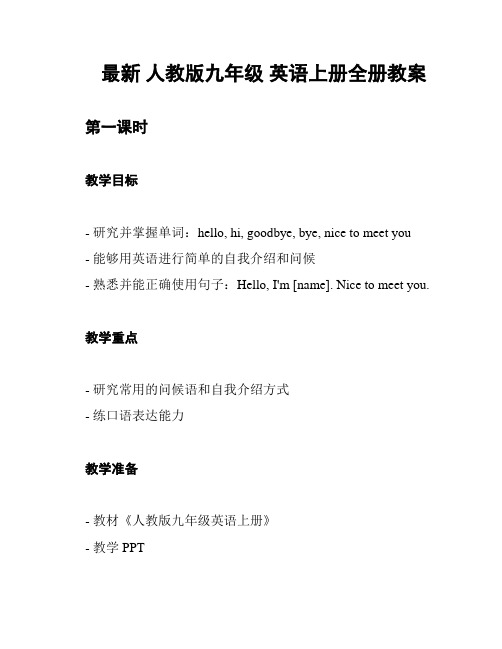
最新人教版九年级英语上册全册教案第一课时
教学目标
- 研究并掌握单词:hello, hi, goodbye, bye, nice to meet you
- 能够用英语进行简单的自我介绍和问候
- 熟悉并能正确使用句子:Hello, I'm [name]. Nice to meet you. 教学重点
- 研究常用的问候语和自我介绍方式
- 练口语表达能力
教学准备
- 教材《人教版九年级英语上册》
- 教学PPT
教学步骤
1. 导入新课,向学生简要介绍本节课的内容,并激发学生研究
的兴趣。
2. 分发教材,让学生跟读单词:hello, hi, goodbye, bye, nice to meet you。
3. 解释单词的意思,帮助学生掌握词汇。
4. 利用示范和展示图片等方式,让学生理解并掌握句子:Hello, I'm [name]. Nice to meet you.
5. 引导学生进行口语练,让他们用所学内容进行自我介绍和问候。
6. 收集学生的口语表达,进行点评和纠正。
7. 结束本节课,作简单复,并布置下节课的预内容。
教学延伸
- 练更多的问候语和自我介绍方式,丰富学生的口语表达能力。
- 制作小组或角色扮演活动,让学生在真实情境中运用所学内容。
教学评价
- 观察学生的参与程度和口语表达能力,及时给予鼓励和指导。
- 收集学生的口头回答、书面练习,进行评估和改进教学策略。
九年级英语上册 Unit 4 Stay Healthy Lesson 28 Move Your Wh
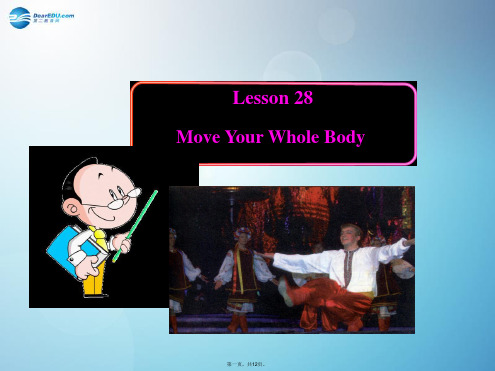
Move your feet!
Move your arms!
Move your feet!
Move your arms!
Move your whole body.
Move your whole body.
Move your feet!
Move your arms!
9.The ___(much) you eat, the____ (fat) you’ll be.
第十页,共12页。
Homework
Write about how you keep healthy.
Give a report to the class.
第十一页,共12页。
Empty vessels make the greatest sound. 实磨无声(wúshēng)空磨响,满瓶不动半瓶摇。
第八页,共12页。
Practice
1.body(复数(fùshù))________ 2.whole(同音词)______
ห้องสมุดไป่ตู้
3.stay(单三)_________ 4.foot(复数(fùshù))_______
5.healthy(比较级)______ 6.potato(复数(fùshù))_____
17.上上下下_________ 18.好运____________
第九页,共12页。
1.Yao Ming is one of the best basketball _______(play). 2.The shop is ____ (close) at this time of day. 3.Mr.Brown got ______(dress) quickly. 4.An____(ill) make you feel sick.
人教版九年级上册英语教案5篇
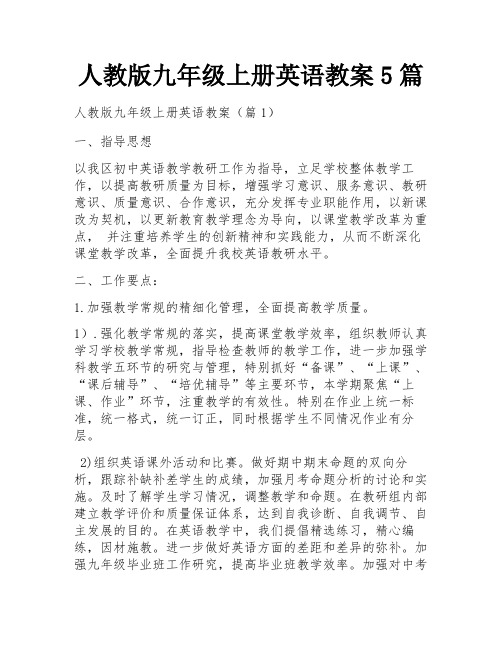
人教版九年级上册英语教案5篇人教版九年级上册英语教案(篇1)一、指导思想以我区初中英语教学教研工作为指导,立足学校整体教学工作,以提高教研质量为目标,增强学习意识、服务意识、教研意识、质量意识、合作意识,充分发挥专业职能作用,以新课改为契机,以更新教育教学理念为导向,以课堂教学改革为重点,并注重培养学生的创新精神和实践能力,从而不断深化课堂教学改革,全面提升我校英语教研水平。
二、工作要点:1.加强教学常规的精细化管理,全面提高教学质量。
1).强化教学常规的落实,提高课堂教学效率,组织教师认真学习学校教学常规,指导检查教师的教学工作,进一步加强学科教学五环节的研究与管理,特别抓好“备课”、“上课”、“课后辅导”、“培优辅导”等主要环节,本学期聚焦“上课、作业”环节,注重教学的有效性。
特别在作业上统一标准,统一格式,统一订正,同时根据学生不同情况作业有分层。
2)组织英语课外活动和比赛。
做好期中期末命题的双向分析,跟踪补缺补差学生的成绩,加强月考命题分析的讨论和实施。
及时了解学生学习情况,调整教学和命题。
在教研组内部建立教学评价和质量保证体系,达到自我诊断、自我调节、自主发展的目的。
在英语教学中,我们提倡精选练习,精心编练,因材施教。
进一步做好英语方面的差距和差异的弥补。
加强九年级毕业班工作研究,提高毕业班教学效率。
加强对中考走势的信息收集和测试研究,集中精力,争取在九年级中考中取得一个满意的成绩。
2.?以教科研引领,为教师的专业化成长打造新的平台。
1).大力开展校本教研,拓宽教师课程视野,逐渐成为学习型、反思型教师。
通过同伴互动。
充分发挥学校骨干教师、优秀教师的作用,通过“共享式的集体备课”、“探究式的课堂实践活动”和“专题式的学习讨论活动”等促进教师之间的互动,营造“集体备课、资源共享、个人加减、教后反思”的教研氛围。
结合优质课堂活动,并且推出一节具有代表性的研讨课。
(陈美红老师开课)2).根据各年级特点,进行一次主题教研活动。
人教版九年级上册英语教案(优秀8篇)

人教版九年级上册英语教案(优秀8篇)作为一位兢兢业业的人民教师,总归要知道如何编写一份优秀的教案。
这次为您整理了8篇《人教版九年级上册英语教案》,亲的肯定与分享是对我们最大的鼓励。
九年级上册英语教案篇一一、教学内容本课是第二单元的最后一课,阅读课,是本单元话题过去的某种状态的延伸和继续。
文章讲得主要内容是一个老是惹麻烦的男孩在明白了母亲对他的爱之后变成一个好孩子的故事。
二、教学目标⑴掌握一些主要的词汇和句型used to be like 等。
⑴引导学生理解课文内容,掌握阅读技巧,如扫读、细读、概括文章大意,利用上下文信息猜词等。
⑴通过阅读课文,并设计各种活动训练学生运用英语进行听说读写各种活动的能力。
⑴激发学生感恩父母,热爱父母,关注身边的人的情感。
三、教学重点和难点⑴训练学生利用上下文信息填写词汇和句子的能力。
⑴培养学生的阅读策略和写作能力。
⑴利用本课所学知识表达个人意见,对课文进行深层理解。
四、设计理念依据纽南(David Nunan)所提出的任务型及合作式教学原则,使学生在小组学习中获取信息,处理信息和运用信息,激发学生用所学语言进行交际的愿望和自信心,促进合作精神和文化意识的发展。
五、教学设计1. 总体思路:本节课是在多媒体的课堂教学环境下实施的大容量、快节奏的课堂教学。
笔者先让学生简短描述父母以前和现在的职业,外貌,性格,爱好再欣赏英文歌曲thank you, dad. 导入,酝酿了一种感激父母的氛围,接着引导他们畅诉父母对自己的帮助的故事,然后让学生阅读短文,感受母亲爱的伟大。
在阅读过程中,通过让学生看标题,预测课文内容、概括文章段落大意、根据上下文填所缺的句子,判断正误等各种方式提高阅读技能。
最后,笔者提供关键词让学生复述课文,使其能熟练得掌握所学的重点词汇、短语和句子。
阅读后,笔者抛出这样的问题让学生讨论:我们该用什么方式报答父母?培养学生反哺意识。
最后通过写作,提高学生综合运用语言的能力。
中考英语复习教案+学案: 第28课时 九上 Unit 4
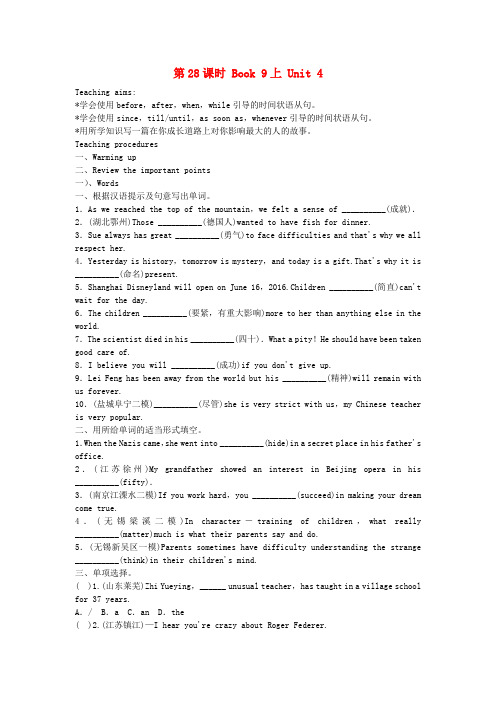
第28课时 Book 9上 Unit 4Teaching aims:*学会使用before,after,when,while引导的时间状语从句。
*学会使用since,till/until,as soon as,whenever引导的时间状语从句。
*用所学知识写一篇在你成长道路上对你影响最大的人的故事。
Teaching procedures一、Warming up二、Review the important points一)、Words一、根据汉语提示及句意写出单词。
1.As we reached the top of the mountain,we felt a sense of __________(成就).2.(湖北鄂州)Those __________(德国人)wanted to have fish for dinner.3.Sue always has great __________(勇气)to face difficulties and that's why we all respect her.4.Yesterday is history,tomorrow is mystery,and today is a gift.That's why it is __________(命名)present.5.Shanghai Disneyland will open on June 16,2016.Children __________(简直)can't wait for the day.6.The children __________(要紧,有重大影响)more to her than anything else in the world.7.The scientist died in his __________(四十).What a pity!He should have been taken good care of.8.I believe you will __________(成功)if you don't give up.9.Lei Feng has been away from the world but his __________(精神)will remain with us forever.10.(盐城阜宁二模)__________(尽管)she is very strict with us,my Chinese teacher is very popular.二、用所给单词的适当形式填空。
英语九年级上册第22课时—第28课时 导学案

第22课时Unit 4 welcome to the unit[学习目标]1.学生能够了解认识世界的途径。
2.学生能够学会谈论各自认识世界的途径。
[活动方案]Activity I 请同学们认真阅读课本P48-49页的课文,找出下列这些词或词组。
1. 时期,时代 2. 无论何时3. 以,凭借4. 挂在心上,惦念5. 一…就…6. 成长7. 直到…才…8. 结束做某事9. 了解世界10. 在不同的年代和地方11. 通过因特网12. 大量的信息Activity IIWelcome to the unit1.Free talk:How do you learn about the world?2. Answer two questions according to the conversation on P49.1)How does Millie learn about the world? Why?2) How does Simon learn about the world? Why?3. Use the conversation on Page 49 as a model to work in pairs.Comic strip1. Listen to the tape and answer two questions.1) What’s on Eddie’s mind?2) Will Eddie build his house by himself?2. Act out the dialogue.[检测反馈]( )1. You don’t know whether the shoes fit you you try them on.A. whenB. ifC. untilD. as soon as( )2. I will do some cleaning as soon as I my homework.A. finishB. will finishC. has finishedD. finished 【巩固提升】I.根据句意及首字母或汉语提示完成句子1. We can learn about the world the Internet..2. People wear different clothes at different (时代).3. Swimming is not (允许) at this beach.4. You can’t leave your son by h_________ at home.5. The loss of the money has been a weight on my m_________.6. My father has been to many different (place).7. We will have a party if it (not be) rainy tomorrow.8. I’ll turn off the TV as soon as the Voice of China(end).II.根据汉语意思完成句子1. 那时我们简直无法理解他脑子里在想些什么。
九年级上Unit 7 Talking about future Lesson 28教案

广州版初中英语教材Success with English九年级上Unit 7 Talking about future Lesson 28教案教材分析本课是本教材第七单元的第四课,课文以对话的方式呈现了在电台节目中主持人对一位歌手的采访,并以“be + v-ing (连系动词加动词的现在分词式)表示将来的计划”这一语法知识渗透在课文的前后。
学生分析我所任教的班级是级组平行班中英语学习能力、水平相对教好的班,学生都能积极投身英语课堂学习的每一个环节。
因此在设计课堂活动中,本人会大胆想象一切能激发学生兴趣、活跃课堂气氛的、并能联系课文知识的趣味活动。
而且在教学的过程中还会向学生渗透一定的情感教育,这能使我的课堂教学目标更符合新课程标准提出的要求。
教学目的*简要文字叙述⏹To revise and practise the grammar ‘the present continuous tense as future’and‘indirect speech’ in Lesson 25 and Lesson 26复习并应用在前面课文学习的“现在进行时态表示将来计划”及“间接引语”两种语法知识。
⏹To make the students realize the importance of leaning to share with the peoplearound them.使学生认识到“与他人分享快乐,也是一种快乐”的重要性。
(情感教育)* 详细架构及分析一.认知目标调朗读课文。
√√1.住本课词汇表中所列的单词和习惯用语programme,listener, rock, pop,4.能找出并归纳文章的关键词语5.能运用关键词语作简短汇报掌握语法:现在进行时态√√√√二.能力发展目标培养和发展学生的语言智能,逻辑-数学智能,视觉-空间智能, 身体-运动智能,人际关系智能,音乐智能,自我认识智能,自然观察智能等八方面的智能。
九年级英语28课教学通案
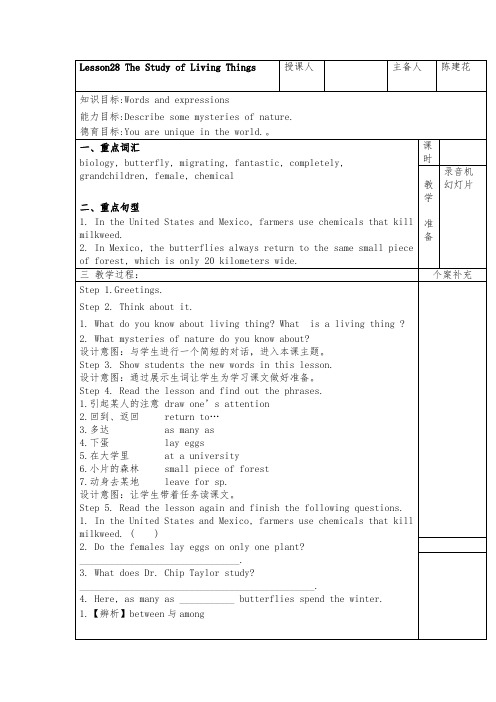
3) lie (平躺) --- lay --- lain --- lying
4) The hens _____ (lay) eggs every day.
5) Have you ever ______ (lie) to your parents?
1. In the United States and Mexico, farmers use chemicals that killmilkweed. ( )
2. Do the females lay eggs on only one plant?
________________________________.
2.回到、返回return to…
3.多达as many as
4.下蛋lay eggs
5.在大学里at a university
6.小片的森林small piece of forest
7.动身去某地leave for sp.
设计意图:让学生带着任务读课文。
Step 5.Read the lesson again and finish the following questions.
e的用法use…to do sth.用……做某事
He is using a knife to cut bread.他正用小刀切面包。
【注意】use的形容词是useful,它是由use加后缀-ful构成的。如:
IStep 6. Language Points
1. attention
1)draw one’s attention to sth. (使某人注意某事).
设计意图:与学生进行一个简短的对话,进入本课主题。
九年级英语28课知识点

九年级英语28课知识点Unit 28:Health and Fitness本单元主要介绍了与健康和健身相关的词汇和知识点。
以下是本单元的主要知识点总结:1. Words and Expressions(单词和短语)(1) fitness:健康,健身(2) diet:饮食(3) nutrition:营养(4) physical exercise:体育运动(5) strengthen:加强(6) flexible:灵活的(7) balance:平衡(8) reduce stress:减轻压力(9) maintain a healthy weight:保持健康体重(10) improve cardiovascular fitness:改善心血管健康2. Grammar(语法)(1) Comparative and Superlative Adjectives:比较级和最高级形容词e.g. healthy, healthier, healthiest(健康,更健康,最健康)(2) Modal Verbs:情态动词e.g. should, shoul dn’t(应该,不应该)(3) Infinitives of Purpose:目的不定式e.g. to improve, to reduce, to maintain(为了改善,减少,保持)3. Reading(阅读)本单元的阅读部分主要是关于健康生活方式的建议和相关的故事。
通过阅读,学生可以了解到如何保持健康的方法以及健康对个人生活的重要性。
4. Speaking(口语)本单元的口语部分主要围绕着健康话题展开,学生可以通过参与对话和小组讨论来表达自己的观点和建议,同时提高口语表达能力。
5. Writing(写作)在写作部分,学生将学习如何写一篇关于健康的短文。
学生需要组织自己的思路并用适当的词汇和句子结构来描述健康和健身的重要性,同时可以提供一些健康的建议。
九年级英语上Unit5LookintoScienceLesson28TheStudyofLivingThings教案

九年级英语上Unit5LookintoScienceLesson28TheStudyofLivingThings教案Unit 5 Look into Science教学资源下载,还有大量而丰富的教学相关资讯!"spid="_x0000_s1030" arcsize="10923f">◆◆ 教学目标◆ 课前准备◆◆ 教学过程Step 1. Warm-upFree talk:Think about it!1. Would you like to be a biologist when you grow up? Why or why not?2. What mysteries of nature do you know about?Step 2. Presentation1. Lead in: Show the picture of butterfly.2. Explain the new words.3. Show some butterflies and ask students: are they beautiful? What do you know about them?4. Read the lesson by themselves.5. Explain the language points:have been doing sth.:“一直在做某事”,表示从过去某时开始的某个动作或状态一直延续到现在,而且还在进行。
表示动作的延续性、重复性以及感情色彩等。
draw one’s attention:“吸引某人的注意力”。
the phrases about attention:draw one’s attention to sth.使某人注意某事pay attention to sth.注意、留心give one’s attention to sth.关心catch one’s attention引起某人注意as…as… 像......一样否定形式:not as/so... as... eg: I do my homework as carefully as my brother does. 我做作业像我哥哥一样认真。
- 1、下载文档前请自行甄别文档内容的完整性,平台不提供额外的编辑、内容补充、找答案等附加服务。
- 2、"仅部分预览"的文档,不可在线预览部分如存在完整性等问题,可反馈申请退款(可完整预览的文档不适用该条件!)。
- 3、如文档侵犯您的权益,请联系客服反馈,我们会尽快为您处理(人工客服工作时间:9:00-18:30)。
Lesson 28
ⅠTeaching Materials
Words: healthily, clearly, frustrate, frustrated, wonder, worth, confidence
Phrase: be worth sth. have confidence in sb.
Sentences: It’s not a very good line.
Tomorrow if possible.
Sometimes you may even wonder if it’s really worth it.
Grammar: the infinitives
ⅡTeaching Objectives
1.Master the use of the infinitives
2.Try to understand the whole lesson and read it fluently.
3.Master the following materials
Words: healthily, clearly, frustrate, frustrated, wonder, worth, confidence
Phrase: be worth sth. have confidence in sb.
Sentences: It’s not a very good line.
Tomorrow if possible.
Sometimes you may even wonder if it’s really worth it. ⅢTeaching Points
1.The main points—(1) and (2) in the teaching objectives
2.The difficult points: 1. be worth sth. 2. have confidence in sb.
3.
wonder +句子
ⅣTeaching Procedure
anization of the class
The infinitives
2.Revision
A.the use of the infinitives
B. workbook ex. 3
3.The teaching of the new lesson
A.Lesson 28
B.Part 2
Ask the students to match the infinitives and the adverbs and make new dialogues.
C.Part 3
Here’s a dialogue between Tina and Ann. I’d like you to listen and answer. What does Ann want to borrow? Why?
Read and act it.
D.Part 4 Read and learn
1.frustrate, frustrated
2.wonder+句子
3. be worth sth.\ doing sth.
4. have confidence in sth\ sb.
4.Homework
1. Do all the exercises in the workbook.
2. Recite Part 3
Period 2 Do workbook exercises。
